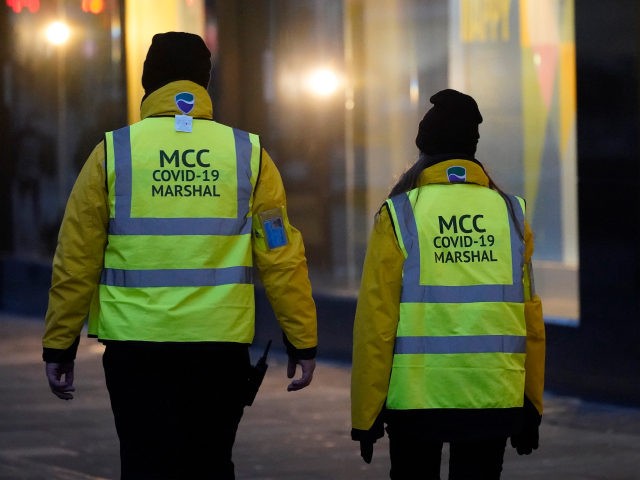Around one-in-nine councils across England are employing covid marshals even after the end of restrictions on June 21st, with reports some contracts allow for the extension of roles until 2023.
Prime Minister Boris Johnson announced the rollout of “COVID Secure Marshals” in September 2020, a form of civic officer to “help ensure social distancing in town and city centres”. The government later outlined that COVID Secure Marshals do not have the authority to either enforce social distancing rules or issue fines.
Funding for the stewards comes from central government rather than local or regional authorities. The government made available £30 million in taxpayers’ money for all local authorities in England “to spend on COVID-19 related compliance and enforcement activities”, with funding for the marshals coming from this budget.
The Telegraph reported on Tuesday that of the councils it had contacted, one in nine were planning to continue employing community coronavirus marshals after the projected end of restrictions. Some authorities told the newspaper that it was keeping the number of marshals under review, and were prepared to hire more if they deemed it necessary.
One such local authority is Hertfordshire County Council, on the outskirts of Greater London, which is offering a contract worth some £3 million a year to a third-party organisation to provide 60 marshals from July to January 2022, with the contract coming with a one-year extension to 2023. Their roles include advising businesses on the regulations and encouraging “compliance”.
The marshals’ job description outlines the following responsibilities: “Provide practical support to aid and encourage compliance, such as dedicated staff in public areas, business support, or support for individuals.”
“Introduce measures to aid public and business awareness and understanding of regulations and guidance,” the contract notice continued.
UK Minister: Snitch on Your Neighbours If They Break Coronavirus Rules https://t.co/NvExuge8Uk
— Breitbart London (@BreitbartLondon) September 14, 2020
The Hertfordshire authority said in a statement in response to queries related to the contacts notice that “the recruitment of more Covid Marshals is not indicative of any increases in restrictions from July 2021 onwards”.
The council’s Director of Public Health Jim McManus said: “In line with the Government’s projections for the roadmap out of lockdown, we are working towards restrictions being eased by 21 June 2021, but we know that the virus is still circulating and will be for some time.”
Mr McManus added that the government had been “very clear that we should plan in case a third wave arises”.
Sunderland City Council, in the north-east of England, was recruiting for covid marshals with an immediate start date, offering a one-year contract, according to the Press Association.
Local press the Lancashire Telegraph, based in north-west England, reported this week that Blackburn with Darwen Council is looking to expand its team of covid marshalls, currently at eight, working on six-month contracts.
Coronavirus: Minister Doubles Down on Snitching, Police Will ‘Come Down Hard’ https://t.co/uOrSTBlfSD
— Breitbart London (@BreitbartLondon) September 21, 2020
Northumberland County Council is also recruiting for a “COVID Support Officer” to work beyond June on a three- to six-month contract, “with Possible Extensions”, according to the jobs posting. Duties include “signposting members of the public and businesses to Covid 19 legislation”, “direct[ing] pedestrians and managing pedestrian one-way systems”, and “to hand out face coverings and hand sanitiser where supplied”.
Councils in Carlisle, Cornwall, Darlington, and Portsmouth are extending their contracts after July, according to The Telegraph.
Conservative MP Mark Harper, the chairman of the lockdown sceptic COVID Recovery Group, branded the expense a waste of taxpayers’ money.
Mr Harper told the newspaper: “To start hiring people based on the situation we faced last year, before we had rolled out the vaccines, does seem to be a waste of public money.
“It doesn’t reflect the fact that by the autumn we will have protected everybody through a successful vaccination programme.”
The Snitching Begins: Nosey Neighbour Calls Police on Wake in Pub Garden https://t.co/Im7r8gX99W
— Breitbart London (@BreitbartLondon) September 18, 2020
The civil ‘policing’ of fellow members of the public has also come under scrutiny for the methods employed by zealous local authority employees.
After the government enforced a curfew on pubs in late September, City of Westminster “inspectors” were seen peeping through the windows of pubs as if they were looking for — as one local termed it –“illegal speakeasies open after the 10 p.m. cutoff”. The UK’s most senior police officer, London Metropolitan Commissioner Cressida Dick, was also seen joining the patrols that month in the popular nightlife neighbourhood of Shoreditch.
Members of the public had also embraced ministers’ calls to snitch on their neighbours if they suspected them of breaching coronavirus lockdown rules, with reports from the Autumn that police alleged Britons were so keen to report members of their community that station telephone lines were swamped.
Brexit leader Nigel Farage had criticised Home Secretary Priti Patel for saying she would call the police if she saw her neighbours breaking the rules, remaking: “Have we become like East Germany where children were encouraged to report on their parents?”
‘Big Boris is Watching You’: Tory MPs Rebel Against UK’s ‘Orwellian’ Coronavirus Regulations https://t.co/W6sp1zAaLV
— Breitbart London (@BreitbartLondon) September 30, 2020

COMMENTS
Please let us know if you're having issues with commenting.